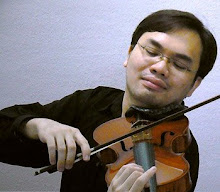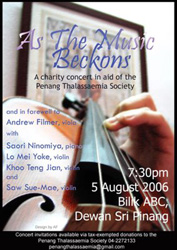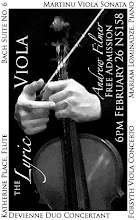
The first road sign I saw on my arrival in Singapore was, ironically, that of Penang Road.
I've been fairly varsity-geared, in part because all but one of the official acceptance letters are in.
In this frame of mind, two things have caught my attention. First is the new reality show called (be warned: spoilers in link!) The Scholar. Second is an article in today's newspaper highlighting an undergrad's ability to "memorize a deck of playing cards in 100 seconds, 750 binary numbers in 15 minutes, 130 random words in 15 minutes, 40 historical dates in five minutes and 196 random numbers in five minutes."
In both, I'm a little disappointed in some degree of emphasis on what you know, rather than how hard you're willing to work. More so in the newspaper article, since it didn't even have any coverage about it coming from mental exercises - just a demonstration of in-born talent. As if that counts for that much. No offence to the person in question of course; this is a criticism of our society's priorities as relected in a national daily.
With The Scholar, at least there are things to balance off the element of memorization like challenges at drawing school spirit - and there was an interesting part in today's episode where Scot indirectly suggested that he was more deserving simply because his parents made less money than the other students. To which Jeremy's response was that his parents worked hard to get into the working class, and the unfairness of suggesting that he was essentially not rich enough for self-funding, but not poor enough for a scholarship.
I like that idea, I really do - which highlights the importance of a merit-based system. Affirmative action has its value when kept to a reasonable extent, but when pushed to the extreme causes more harm than good.
However, the academic challenges in today's episode at least were poorly designed, and cheated Max of a fair chance since the topic of biology was not offered in his high school, and there was practically no time to prepare. It never makes to me why academia and intelligence are perceived generally in one of two ways: 1. the ability to memorize, 2. some Mensa-like strength in seeing patterns.
If it were mua, I'd come up with challenges like: Give a topic which no one has studied before like the complications of African cultural diversity and give a presentation based on on-campus research that includes both library work as well as interpersonal communication. At least then even the losers of the competition would have gained something more tangible in the game.
Whatever its faults, the TV show at least conceptually is a step forward in a generally cerebrally-challenged TV diet today. I know I'm not getting any younger, but heck, when I was a kid, there was Jeopardy!, Wheel of Fortune and 3-2-1 Contact - and I had the unique experience of being a guinea pig in research for the latter.
In other news: thanks to Jason for doing some sound-reengineering on the Weber. Jason runs a podcast, and is listed in my links. Also, from the website of the newest edition of Strings Magazine, apparently I have my first article in international print. It should be available soon on bookshelves in Thailand and Singapore, though I'm unsure of the scene in Malaysia. I'll have to keep an eye out for it, and wait for my complimentary copies to arrive. Boy, so much depends on the mailman.






No comments:
Post a Comment